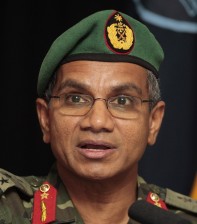
Brig. Gen. of Maldivian National Defense Force Ibrahim Didi speaks at a media briefing in Male, Maldives, Wednesday, Feb. 8, 2012. The military denied that it forced President Nasheed to resign at gunpoint. "There is no officer in the military that would point a gun towards the president," said Didi. Supporters of the Maldives former president rioted through the streets of the capital and seized some remote police stations Wednesday to demand his reinstatement, as the country's new leader appealed for an end to the political turmoil roiling this Indian Ocean island nation. (AP Photo/Eranga Jayawardena)
MALE, Maldives — A top U.N. official was meeting Friday with the current and former presidents of the Maldives, trying to end the political stalemate that has gripped this Indian Ocean nation.
Turmoil in the Maldives escalated sharply Tuesday when President Mohamed Nasheed announced he was resigning after months of protests against his rule and fading support from the police and the army. But the next day Nasheed — who now faces an arrest warrant — announced he had actually been pushed from power at gunpoint. The reality remains unclear.
The current president, Mohammed Waheed Hassan, insists Nasheed stepped down voluntarily. His government has made no move to arrest Nasheed, who is living openly in his home in Male, the capital.
Nasheed is now calling for early elections, insisting his party would emerge victorious.
While the two politicians remain at odds, there has been no sign of violence in the country since Wednesday. On Friday, the first day of the country’s weekend, there was little extra security to be seen in Male, though a few dozen policemen in riot gear were posted outside Nasheed’s house.
U.N. Assistant Secretary-General for Political Affairs Oscar Fernandez-Taranco was to meet with both Nasheed and Hassan, as well as other top political leaders.
“In this atmosphere it is very difficult for any meaningful and national form of discussion. I therefore request all political actors to remain calm and prevent any type of violence,” Fernandez-Taranco told reporters after his Thursday arrival.
In New Delhi, Prime Minister Manmohan Singh said he was sending a special envoy to Male to assess the situation there.
“We sincerely hope that the problems that have arisen there can be resolved in a peaceful way and our effort is to use our influence in that direction,” Singh told reporters.
After his resignation, thousands of Nasheed’s supporters swept into the streets of Male, clashing with security forces, while others attacked police stations in remote parts of this 1,200-island archipelago.
The authorities have not yet announced the grounds for Nasheed’s arrest warrant, and police officials have said it is not clear if the warrant was constitutional.
If the turmoil continues, the dispute threatens the crucial tourism industry of this mostly Muslim nation of 300,000 people, which relies on dozens of high-end resorts that cater to the rich and famous.
Nasheed’s party insist his ouster was engineered by rogue elements of the police and supporters of the country’s former autocratic leader. Others blame Islamic extremists.
Hassan, who was Nasheed’s vice president, has denied claims of a plot to oust Nasheed and called for a unity coalition to be formed to help the country recover.
Nasheed’s resignation marked a stunning fall for the former human rights campaigner who had been jailed for his activism under the 30-year rule of Maumoon Abdul Gayoom. Nasheed also became an environmental celebrity for urging global action against climate change, warning that rising sea levels would inundate his archipelago nation.
Over the past year, Nasheed was battered by protests over soaring prices and demands for more religiously conservative policies. Last month, Nasheed’s government arrested the nation’s top criminal court judge for freeing a government critic and refused to release him as protests grew.